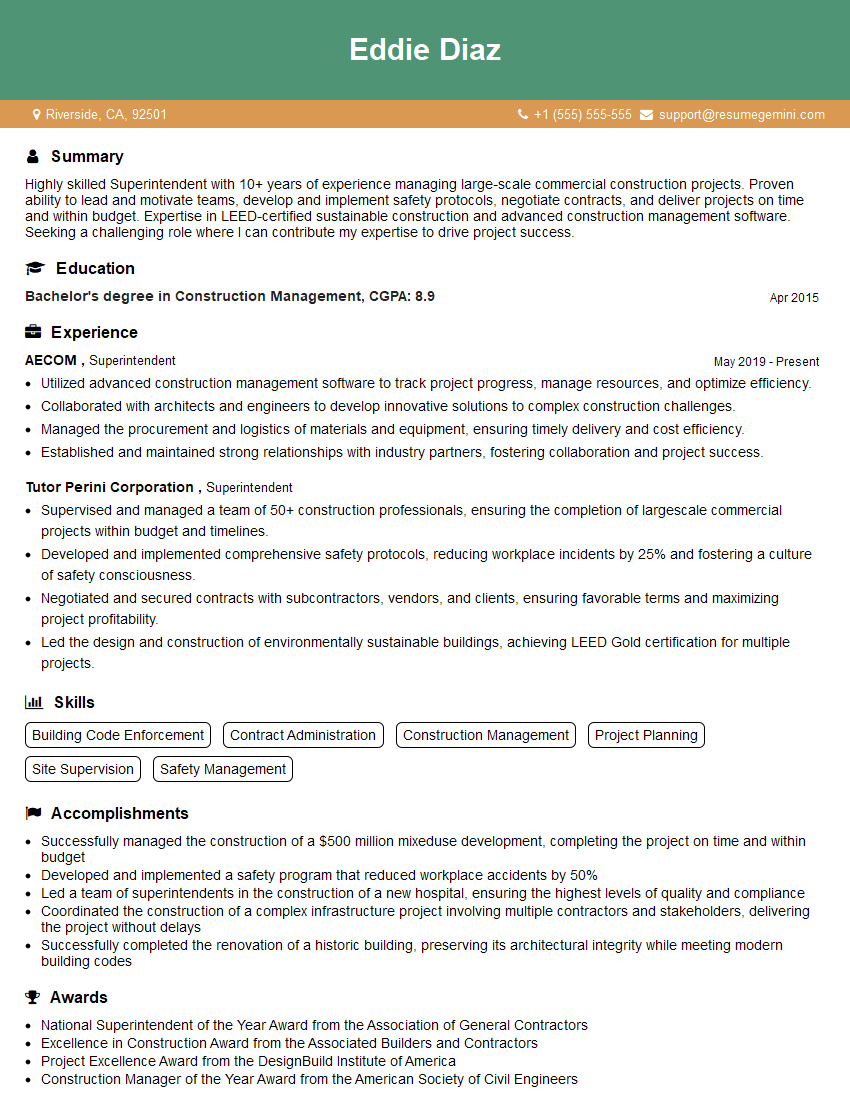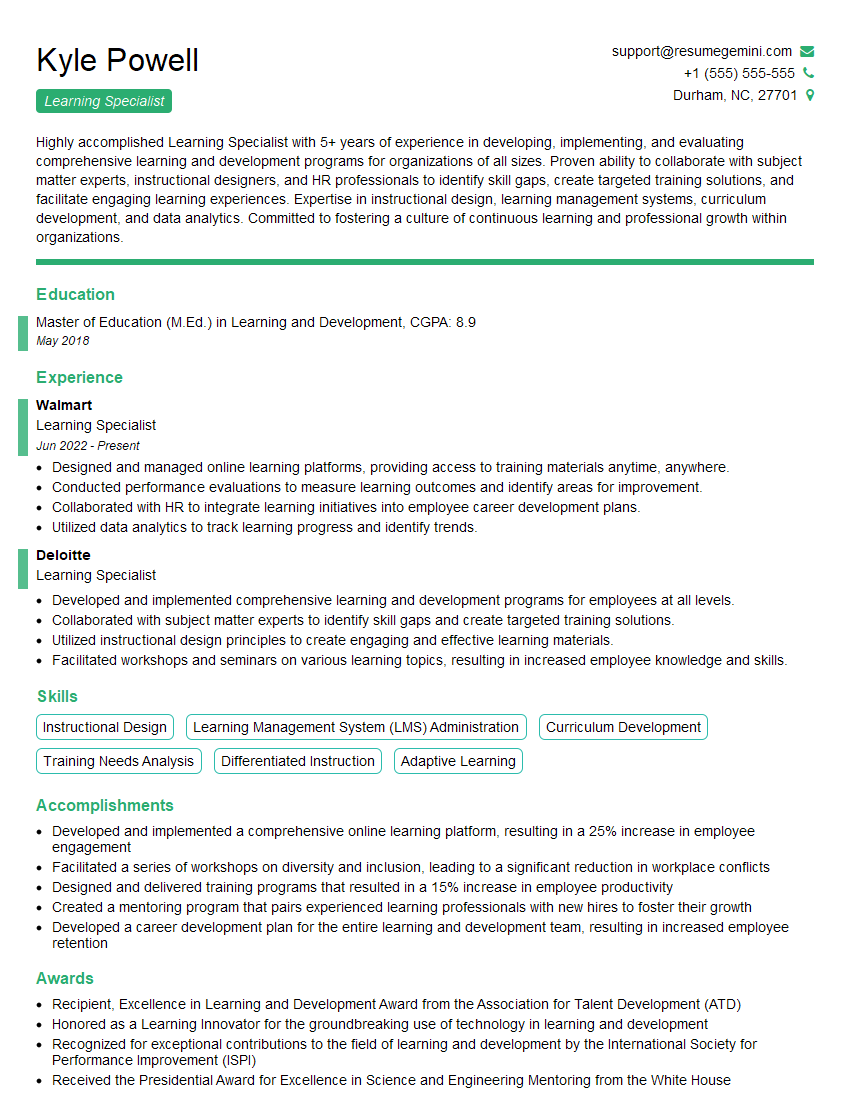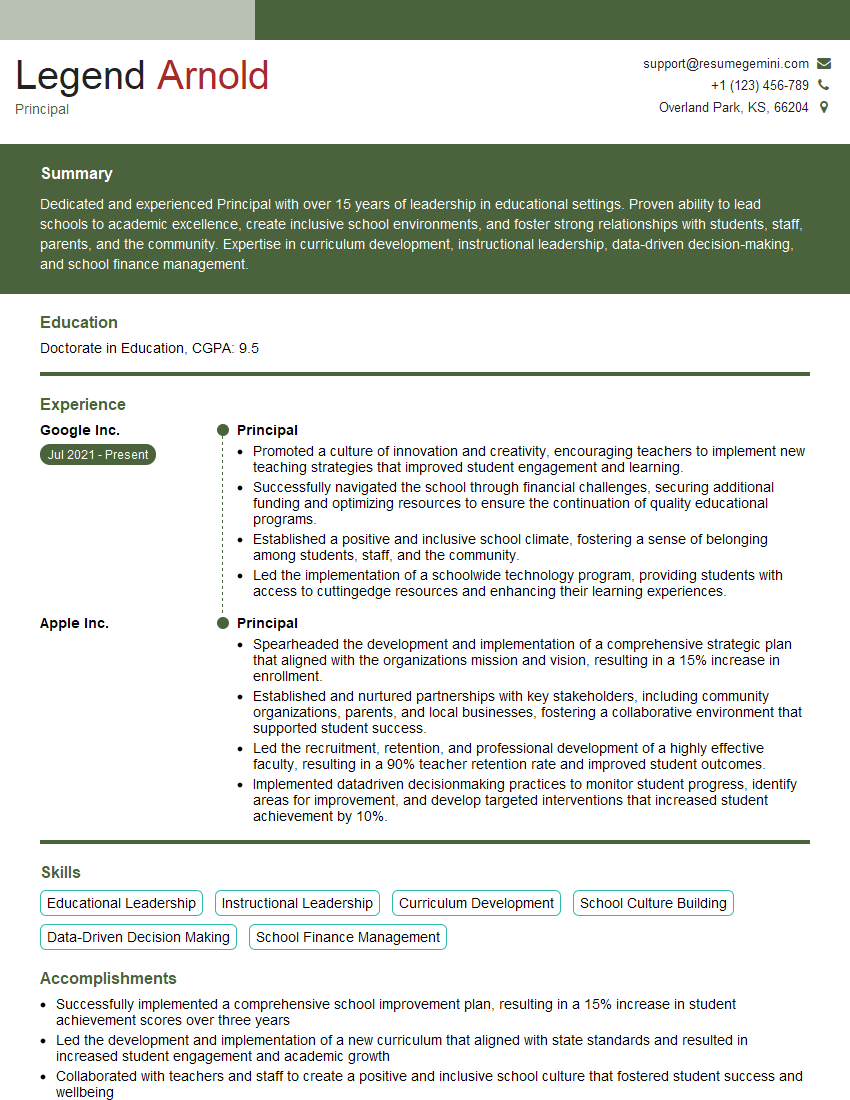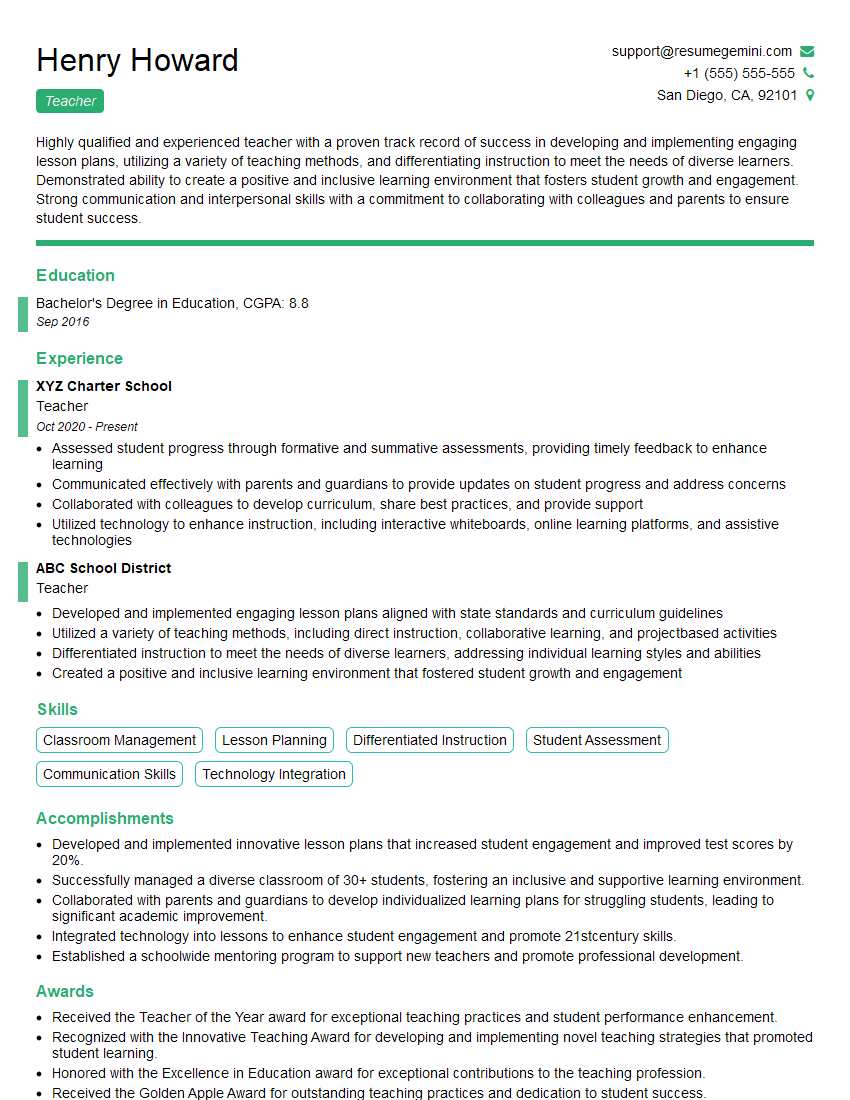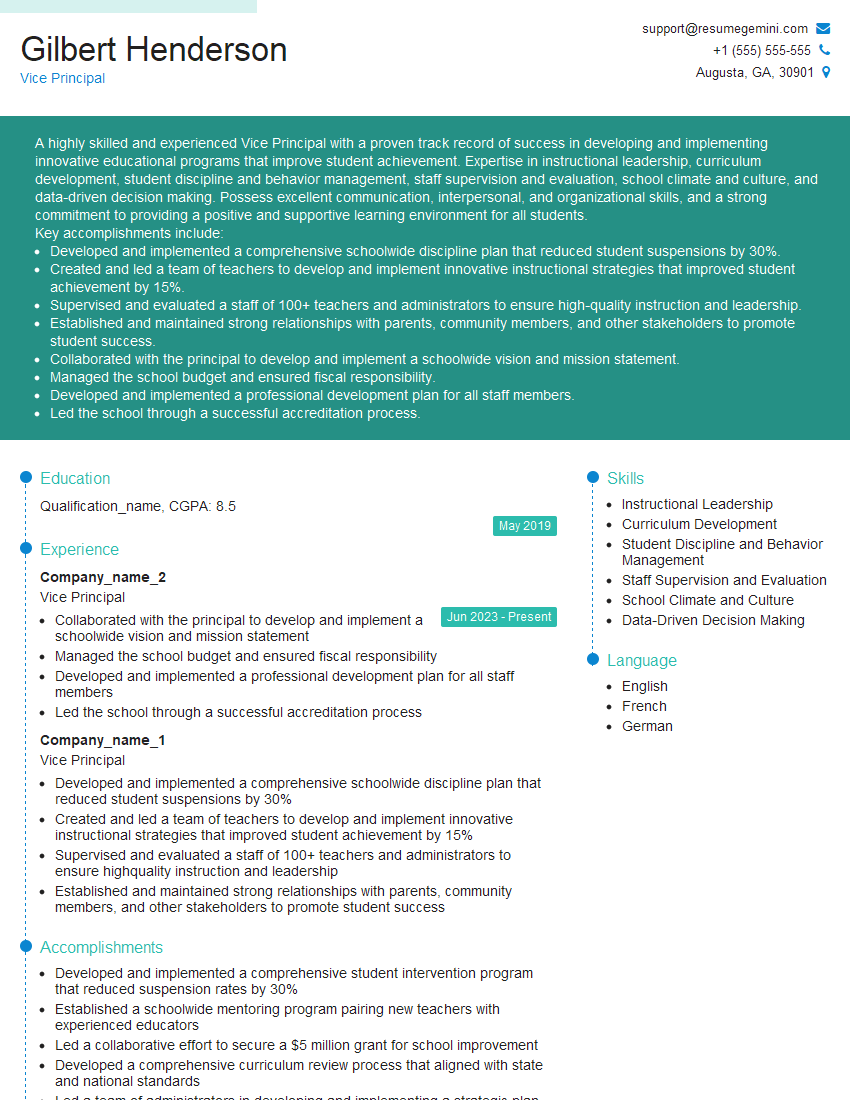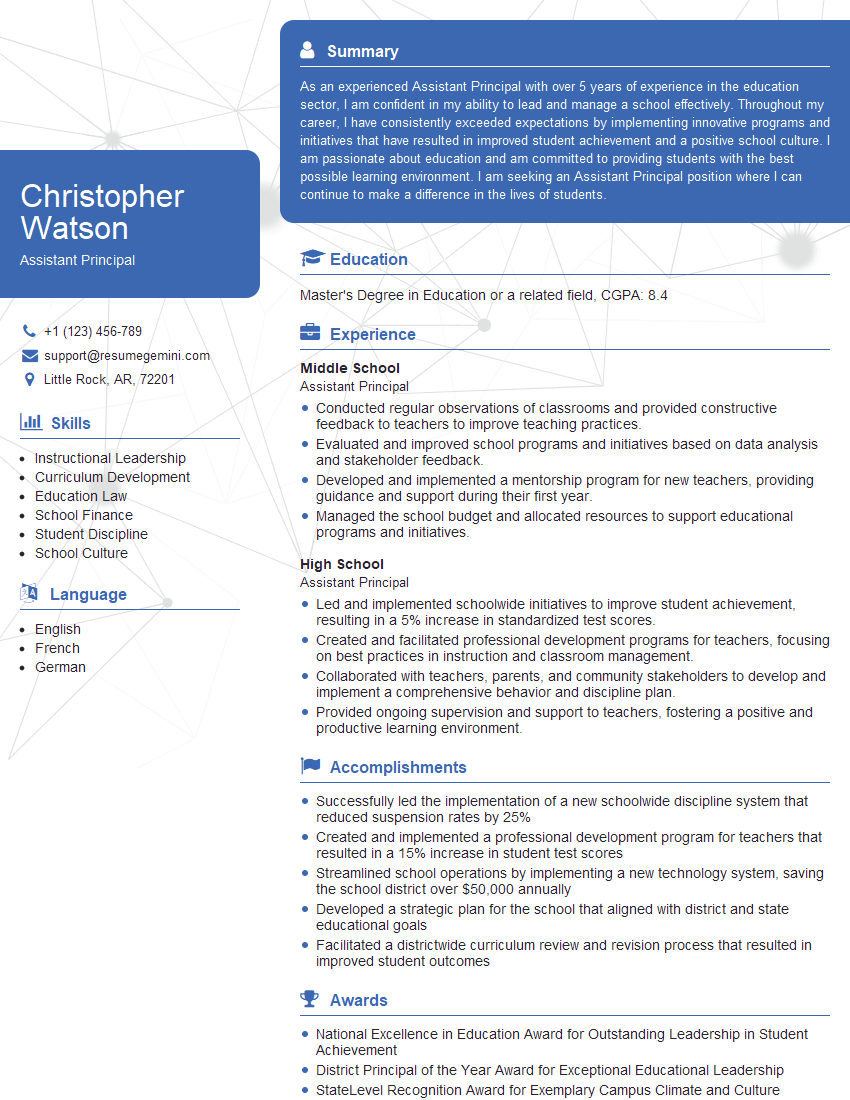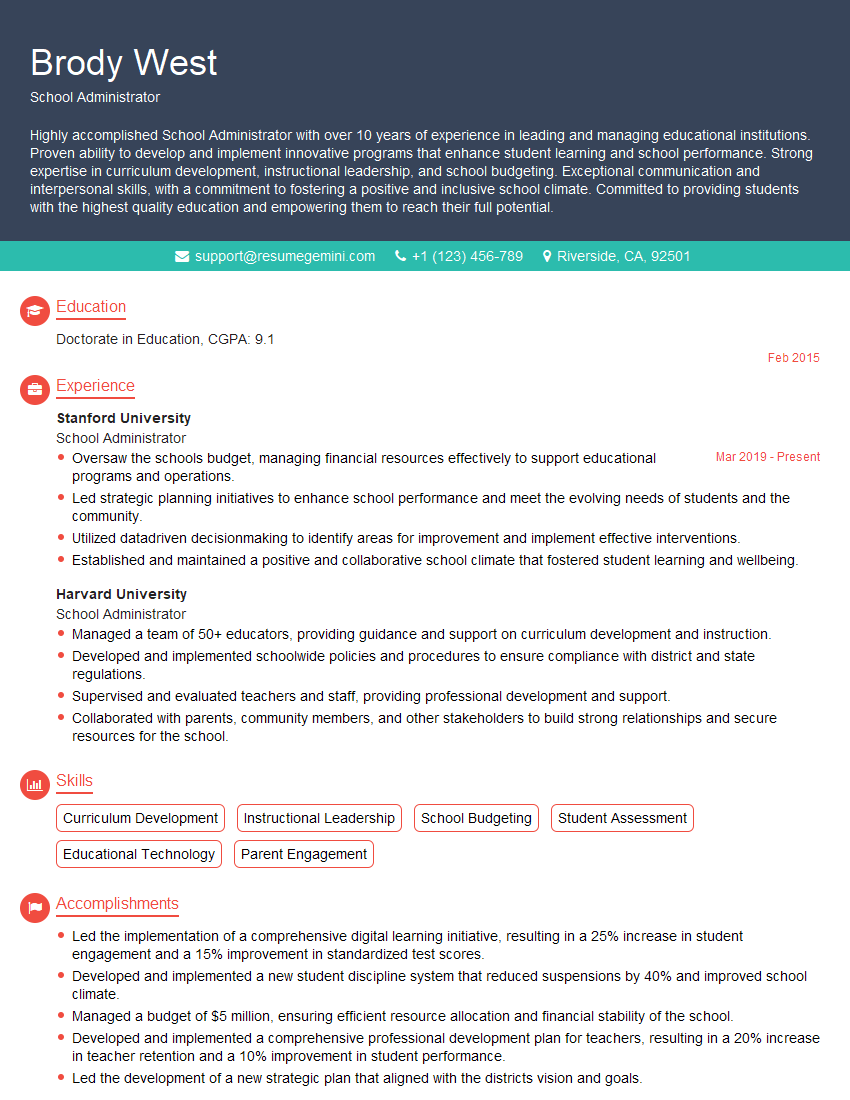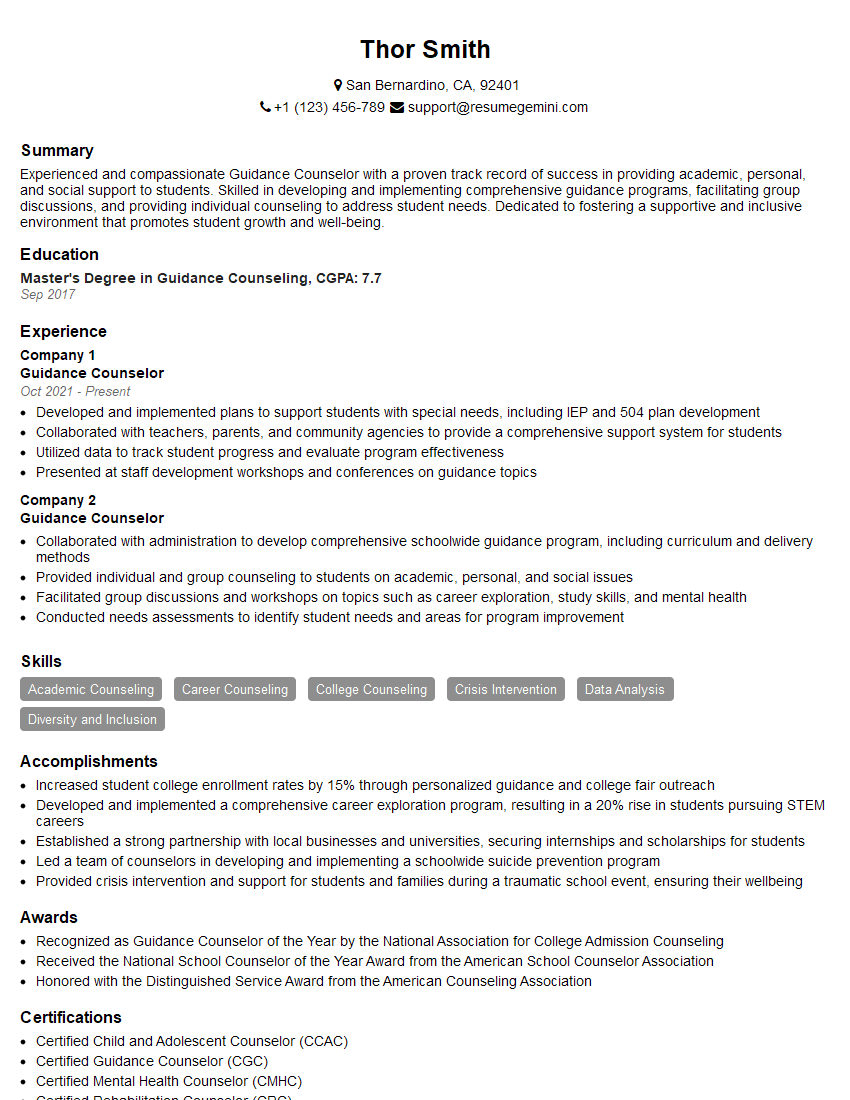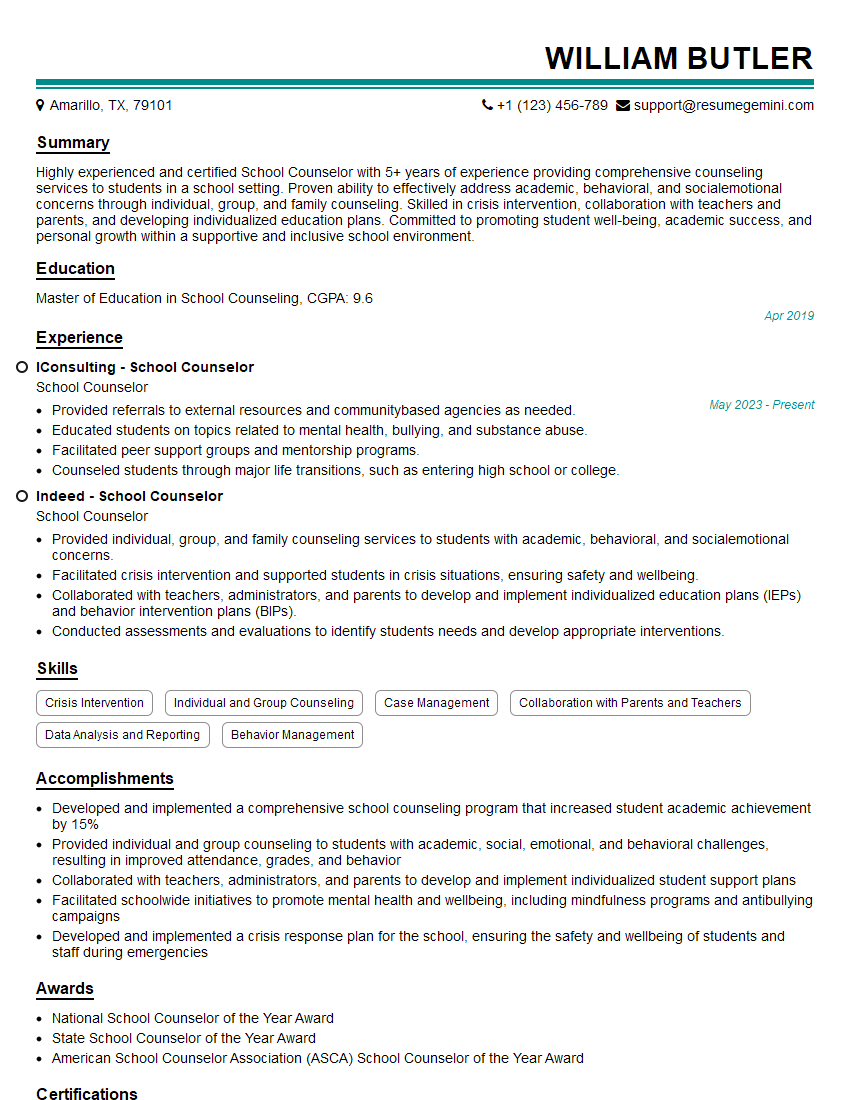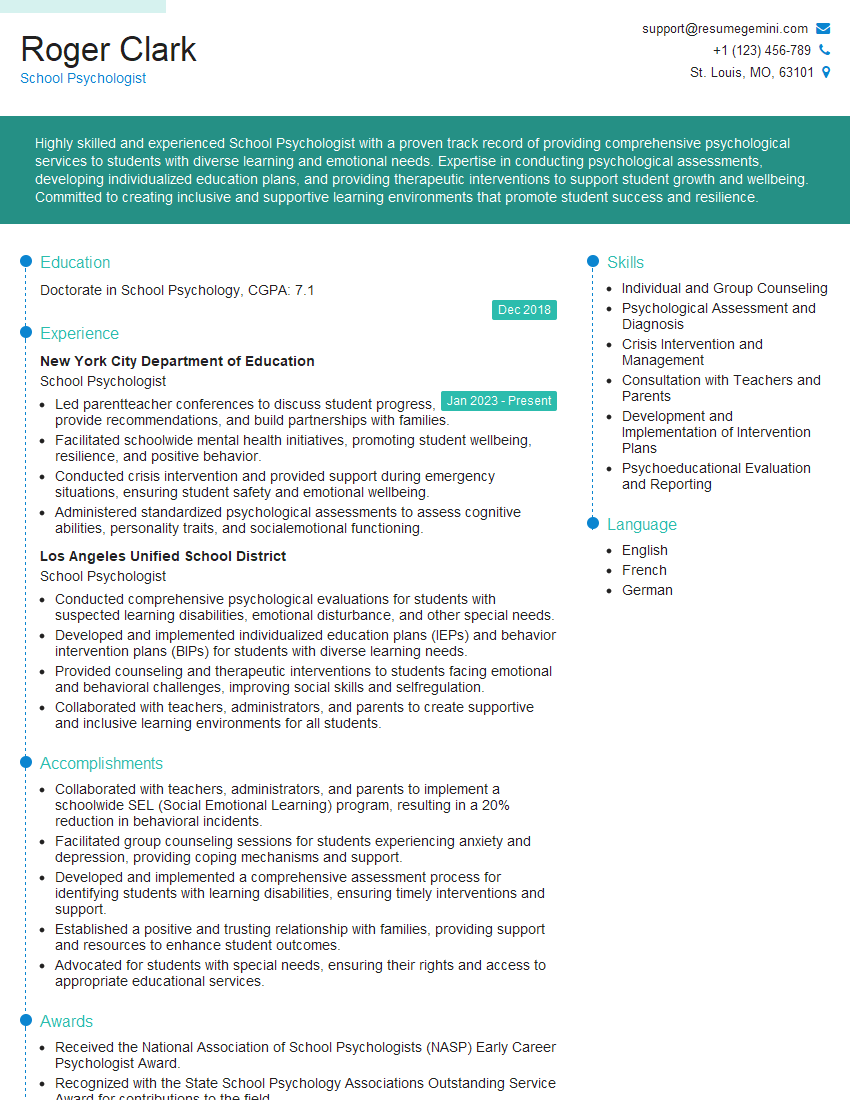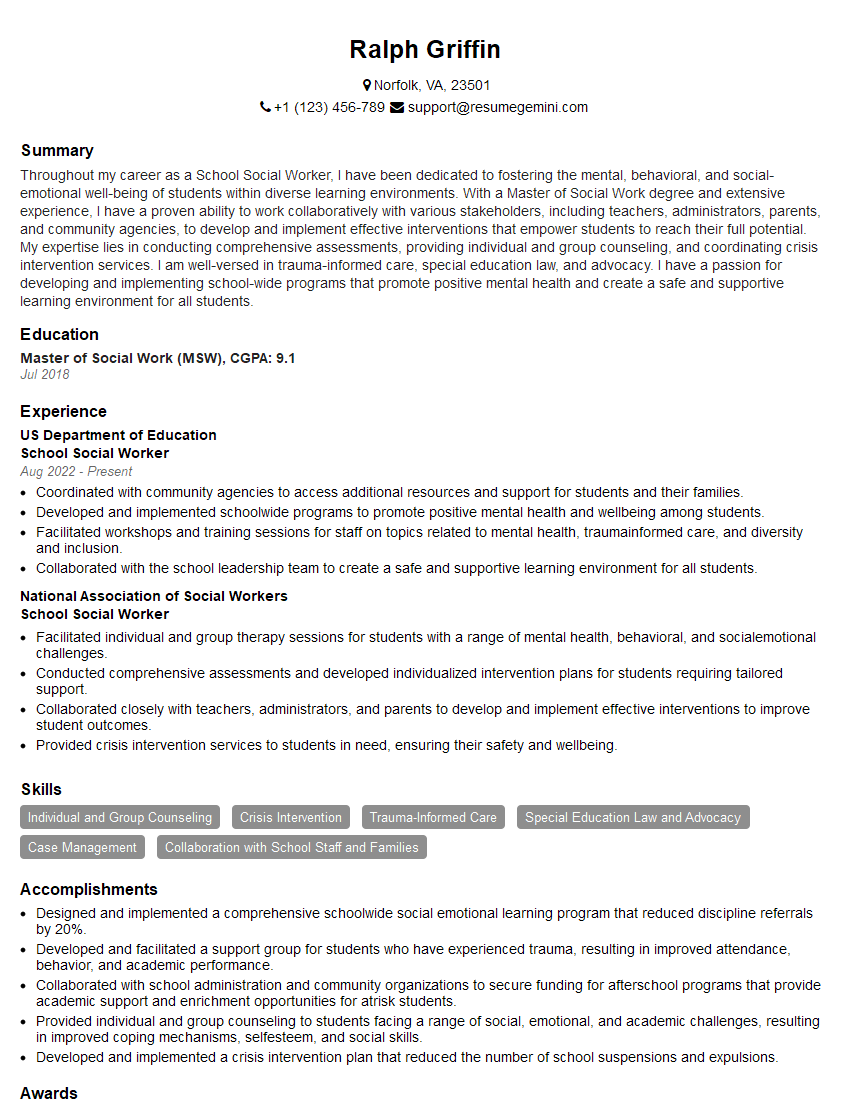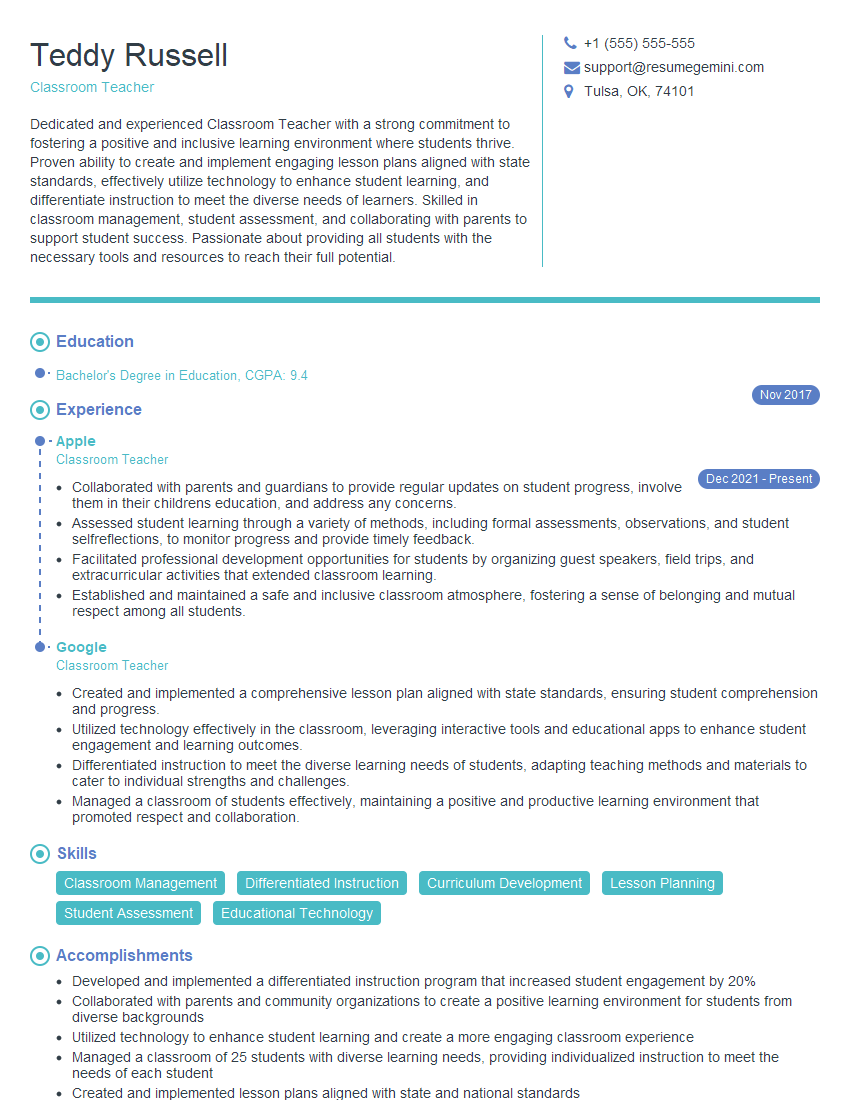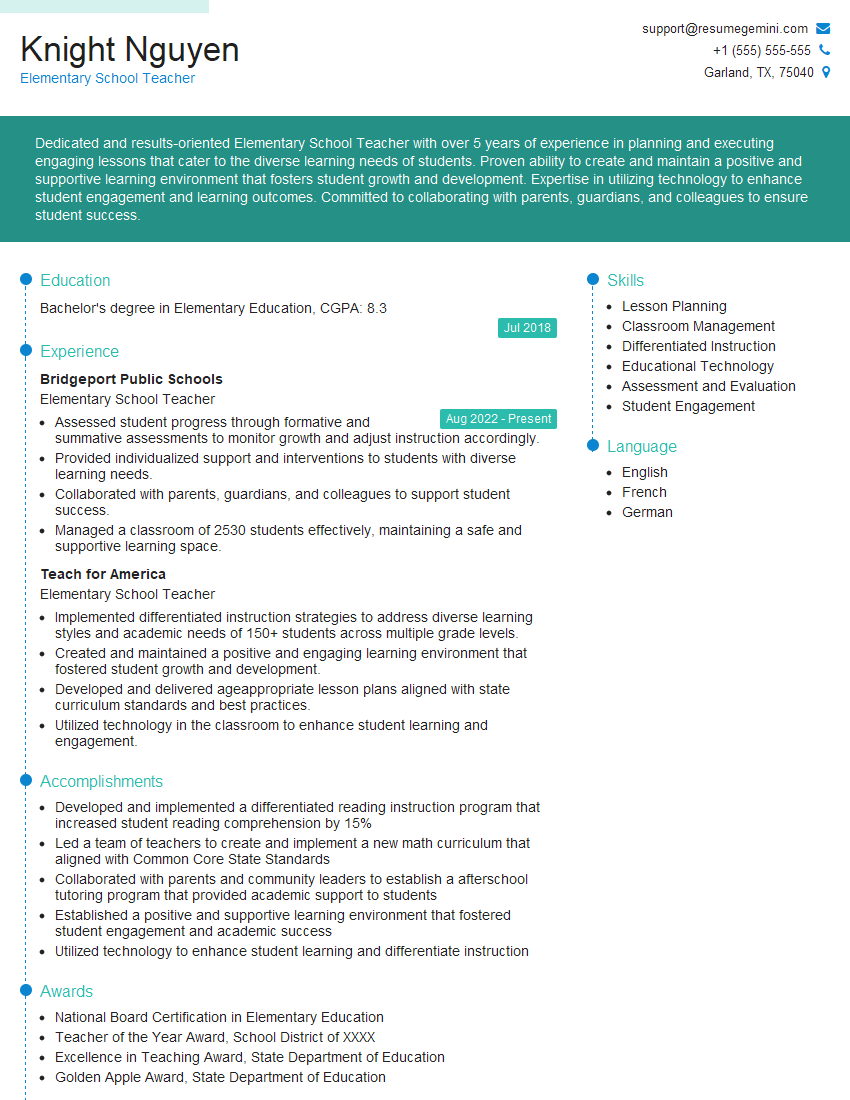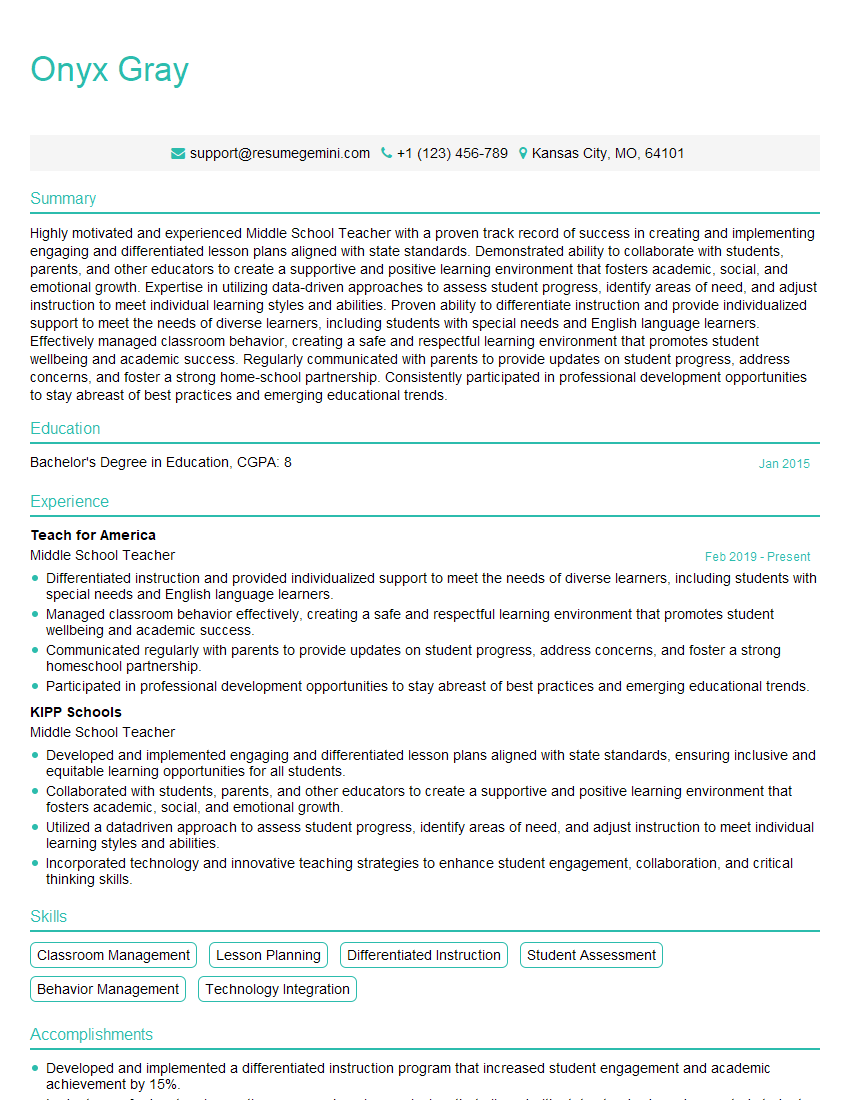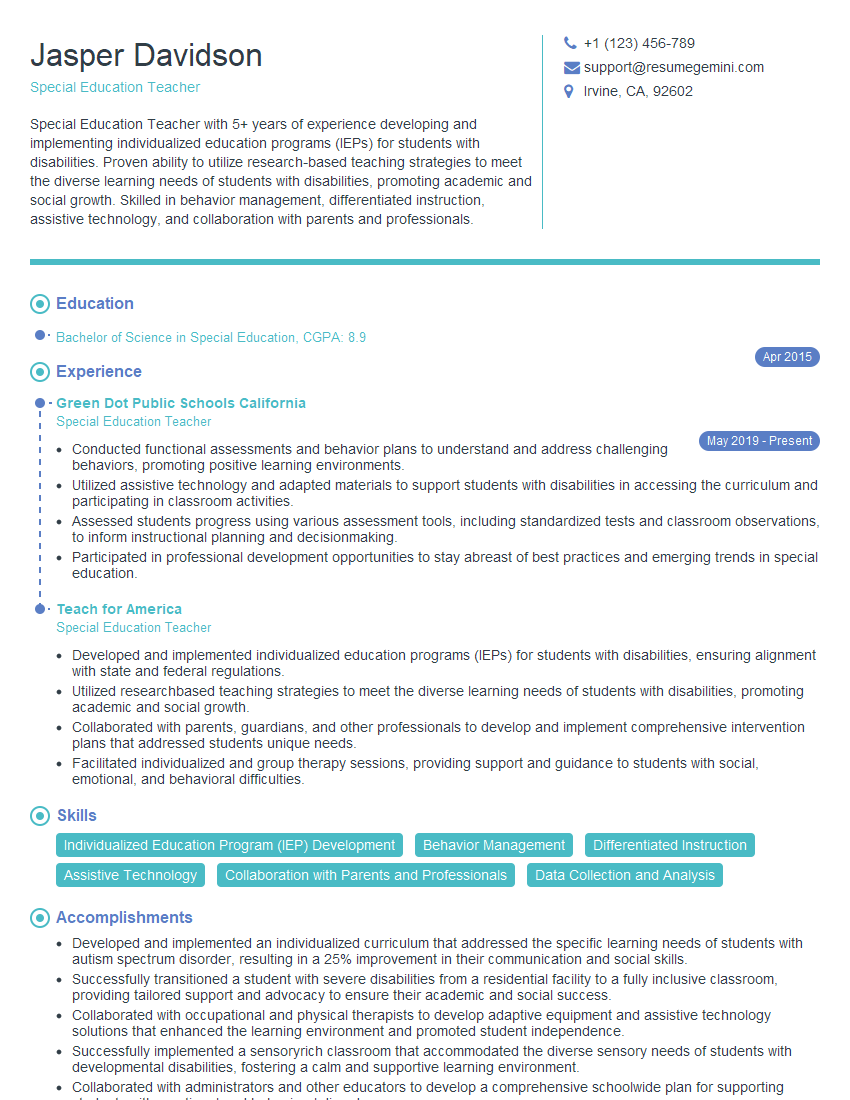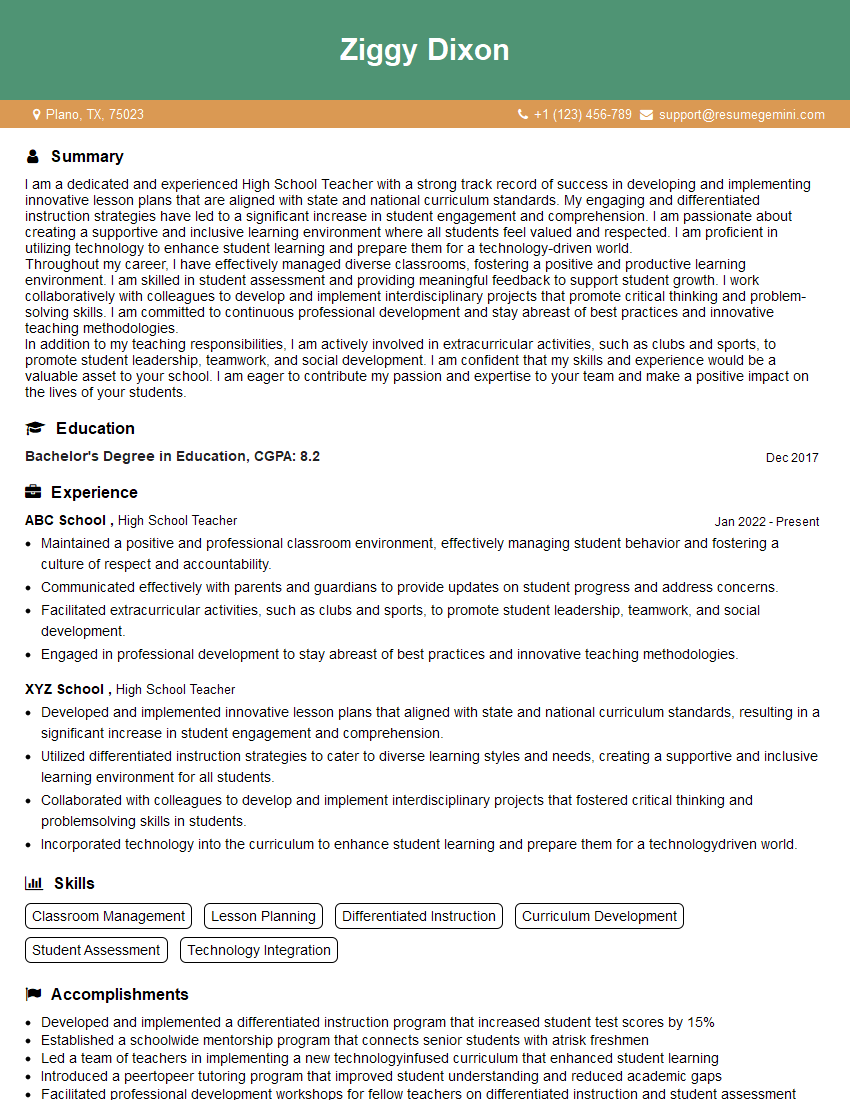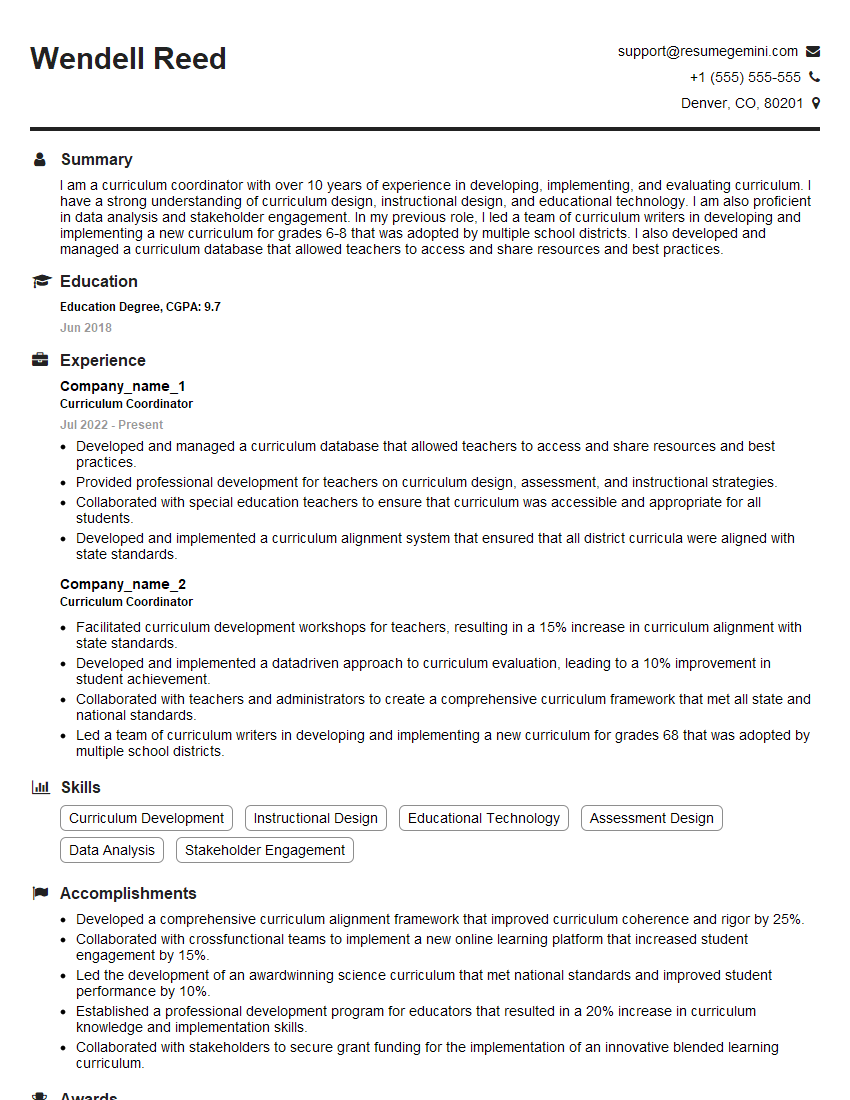Interviews are more than just a Q&A session—they’re a chance to prove your worth. This blog dives into essential Parent-Teacher Conferencing interview questions and expert tips to help you align your answers with what hiring managers are looking for. Start preparing to shine!
Questions Asked in Parent-Teacher Conferencing Interview
Q 1. Describe your approach to preparing for a parent-teacher conference.
Preparing for a parent-teacher conference is crucial for a productive meeting. My approach involves a multi-step process focusing on data gathering, reflection, and planning. First, I thoroughly review the student’s academic performance, including grades, assignments, classroom participation, and standardized test results. This provides a factual basis for the discussion. Next, I reflect on the student’s behavior, social interactions, and any specific challenges or strengths observed. This qualitative assessment complements the quantitative data. Finally, I create an agenda, outlining key discussion points and preparing specific examples to illustrate my observations. For instance, if a student is struggling in math, I might prepare specific examples of their work, highlighting areas of strength and weakness, along with strategies we’re employing to improve.
I also consider the parent’s communication style and preferences, adjusting the information accordingly. A parent who prefers concise communication receives summarized key points while a parent wanting more detail will get a more comprehensive report.
Q 2. How do you ensure a parent feels heard and understood during a conference?
Making parents feel heard and understood is paramount. I achieve this through active listening and empathetic communication. I start by encouraging parents to share their perspectives freely, without interruption. I use verbal and nonverbal cues such as nodding, maintaining eye contact, and summarizing their points to show I’m actively listening and understanding. For example, I might say, “So, you’re saying that you’ve noticed [child’s name] seems less engaged in homework lately?” This validates their observations and creates a space for open dialogue. I then aim to connect their observations with my own, finding common ground to build a collaborative partnership.
Q 3. How do you handle a parent who is upset or disagree with your assessment?
Handling an upset parent requires patience, empathy, and a collaborative approach. I remain calm and validate their feelings, acknowledging their concerns without necessarily agreeing with their assessment. For example, I might say, “I understand your frustration, and I appreciate you sharing your perspective.” I then explain my assessment clearly and factually, using specific examples and data. If there’s a disagreement, I avoid getting defensive and instead focus on finding common ground. We might collaboratively explore strategies to address the issues, involving the student where appropriate. If needed, I suggest additional resources or support, such as tutoring or counseling, ensuring the parent feels involved in finding solutions.
It’s important to remember that the goal is to collaboratively work towards the student’s success. Sometimes, agreeing to disagree is the most effective outcome, but finding shared goals is key.
Q 4. How do you effectively communicate student progress to parents?
Effective communication of student progress relies on a multi-faceted approach. I use a combination of formal and informal assessments to provide a holistic view. Formal assessments, such as report cards and standardized tests, provide a quantitative snapshot of their academic performance. However, I supplement this with qualitative data, detailing classroom participation, effort, social-emotional development, and learning styles. I avoid purely numerical grades; I instead connect grades with observable behaviors and skills. For example, instead of saying “John received a C in math,” I might say, “John is showing good understanding of basic concepts but struggles with problem-solving. We’re implementing strategies to improve this, and I would welcome the opportunity to collaborate on additional support at home.” I also share anecdotal evidence of their work habits, behavior, and progress.
Q 5. Explain your process for gathering data to inform parent-teacher conferences.
Gathering data to inform parent-teacher conferences is an ongoing process, not just a pre-conference activity. I collect data from various sources to provide a comprehensive picture. This includes academic records (grades, assignments, tests), observations of student behavior and participation in class, anecdotal notes from daily interactions, feedback from peers and specialists (if applicable), and any work samples demonstrating strengths and weaknesses. I also review any communication received from parents regarding their child’s progress or concerns. Organizing this data systematically, perhaps in a digital portfolio or a structured document, ensures efficient and effective review during preparation.
Q 6. How do you tailor your communication style to different parents?
Tailoring communication style is essential for effective parent-teacher conferences. I adapt my approach based on parents’ communication preferences and cultural background. Some parents may prefer concise updates, while others want detailed explanations. Some may be more comfortable with formal communication, while others prefer a more informal and friendly approach. I pay close attention to nonverbal cues and adjust my language accordingly. If a parent seems hesitant, I offer explanations in a simpler, more direct manner. Active listening helps identify their preferred communication style and I tailor the information to suit them. For example, I might adjust my use of educational jargon or provide visual aids to clarify concepts. Being mindful of cultural nuances and communication styles ensures better understanding and collaboration.
Q 7. What strategies do you employ to engage parents actively in their child’s education?
Engaging parents actively in their child’s education is key to their success. I employ several strategies, including open communication, shared goals, and collaborative problem-solving. Regular newsletters, email updates, and class websites keep parents informed. I also utilize parent-teacher organizations and volunteer opportunities to foster a sense of community and shared responsibility. Parent workshops and information sessions provide valuable insight into curriculum and learning strategies. Finally, I establish clear expectations for homework, projects, and participation, seeking parental support for consistent reinforcement at home. Regular communication channels, such as email or a class communication app, allow for quick updates and prompt responses to any parental questions or concerns. Building a strong partnership with parents is crucial for the student’s success.
Q 8. How do you address sensitive topics like learning disabilities or behavioral concerns with parents?
Addressing sensitive topics like learning disabilities or behavioral concerns requires a delicate balance of empathy, professionalism, and clear communication. I always begin by creating a safe and comfortable environment for the parents. I start by acknowledging their feelings and validating their concerns. For example, I might say something like, “I understand this news is difficult to hear, and I want to assure you we’re here to support both you and your child.”
Next, I clearly and concisely explain the situation using non-judgmental language, avoiding overly technical jargon. If a child has a learning disability, I’ll explain the specific challenges it presents and how it impacts their learning in a way that is easily understandable. For behavioral concerns, I’ll describe the specific behaviors observed, the frequency, and the impact on the child and classroom environment. I always provide concrete examples without making accusatory statements.
Crucially, I collaborate with parents to develop a plan. This involves outlining strategies and interventions we can use together, including modifications at school, support at home, and possible referrals to specialists. I emphasize that we’re a team working towards the child’s success. It’s important to offer hope and highlight the child’s strengths alongside their challenges. Regular follow-up communication is essential to ensure the plan is working effectively and to make necessary adjustments along the way.
Q 9. Describe a time you had a challenging parent-teacher conference. How did you resolve it?
One particularly challenging conference involved a parent who was very upset about their child’s grades. Initially, the parent was dismissive of my explanation of the child’s lack of effort and frequent absences. They blamed the school and the curriculum, refusing to acknowledge their child’s role. The atmosphere became tense.
To de-escalate the situation, I actively listened to their concerns, validating their frustration without agreeing with their accusations. I then shifted the focus to finding solutions. I shared specific examples of the child’s strengths and areas needing improvement, using data from assessments and classroom observations to support my points. I proposed a collaborative approach, suggesting regular check-ins, homework support strategies, and a meeting with the school counselor to discuss potential underlying issues that might be affecting the child’s performance. I also offered resources like tutoring and after-school programs.
Through consistent communication and a collaborative problem-solving approach, we were able to establish a more positive relationship. The parent gradually became more receptive to our suggestions and started working with us to support their child’s academic progress. The key was active listening, empathy, a focus on solutions, and consistent follow-up communication.
Q 10. How do you document parent-teacher conferences and follow up on action items?
Documentation is crucial for maintaining a clear record of parent-teacher conferences. I typically use a standardized form that includes the date, time, attendees, key discussion points, agreed-upon action items, and assigned responsibilities (teacher, parent, student). This ensures consistency and facilitates accountability.
Following up on action items is essential. I usually send a brief email summarizing the key points and action items within 24 hours of the conference. This email serves as a confirmation and reminder of our agreement. I then follow up periodically (e.g., weekly or bi-weekly, depending on the urgency) to check on progress and offer any further support. Regular communication helps keep everyone informed and ensures consistent progress toward agreed-upon goals. This follow-up might involve phone calls, emails, or brief notes in the student’s file.
Q 11. How do you use technology to facilitate communication with parents?
Technology plays a significant role in facilitating communication with parents. Our school uses a parent portal that allows parents to access their child’s grades, assignments, attendance, and announcements. I also utilize email regularly for sending quick updates, sharing important information, and scheduling conferences.
Furthermore, we utilize a class communication app to share daily updates, photos of classroom activities, and reminders about upcoming events. This fosters a sense of community and transparency. Video conferencing tools enable virtual parent-teacher conferences, offering flexibility and convenience for families who may have scheduling challenges or geographical limitations. These tools increase the frequency of parent-teacher interaction and improve transparency concerning the student’s progress.
Q 12. How do you balance providing constructive feedback with maintaining a positive relationship with parents?
Balancing constructive feedback with maintaining a positive relationship requires a nuanced approach. I begin by framing my feedback positively, focusing on the child’s strengths before addressing areas for improvement. For instance, I might say, “Sarah is a bright and engaged student who participates well in class discussions. However, her written assignments could benefit from more careful proofreading and organization.”
I always use “I” statements to avoid sounding accusatory. Instead of saying “Your child is disruptive in class,” I might say, “I’ve observed that there have been some instances where [child’s name] has difficulty staying focused during instruction.” I collaborate with parents to brainstorm solutions, making them feel like partners in the process rather than recipients of criticism. I emphasize that we share a common goal – the child’s success – and we are working together to achieve it. Active listening and empathy are critical in building and maintaining trust.
Q 13. What resources do you utilize to support parents with their child’s learning?
I utilize a variety of resources to support parents. These include providing links to relevant websites offering parenting tips and educational resources. I recommend age-appropriate books and articles on child development and learning strategies. I connect parents with community organizations that offer tutoring, mentoring, and family support services. I also share information about school-sponsored workshops and parent education programs. In some cases, I might connect parents with specialists, such as therapists or learning specialists, if appropriate.
It’s crucial to tailor my recommendations to each parent’s specific needs and preferences. I try to understand their challenges and strengths, and select resources that match their circumstances. Providing a range of options empowers parents to choose the resources most suitable for their family, creating a sense of ownership and control.
Q 14. How do you involve parents in setting goals for their child’s academic success?
Involving parents in setting goals is key to ensuring their commitment and active participation in their child’s education. I start by discussing the child’s current academic performance, highlighting both strengths and areas needing improvement using concrete examples. I then invite parents to share their aspirations for their child’s academic future.
Together, we collaboratively set SMART goals (Specific, Measurable, Achievable, Relevant, and Time-bound). For example, instead of a vague goal like “improve reading,” we might set a goal like “increase reading fluency by 20 words per minute by the end of the semester, as measured by weekly timed readings.” We discuss strategies for achieving these goals, both at school and at home, ensuring parents understand their role in supporting their child. Regular check-ins help monitor progress and adjust the plan as needed, keeping parents actively involved in the process.
Q 15. Describe your experience working with parents from diverse cultural backgrounds.
Working with parents from diverse cultural backgrounds requires deep cultural sensitivity and a commitment to building bridges of understanding. My approach centers around recognizing that communication styles, family structures, and educational expectations can vary significantly. I begin by acknowledging and respecting these differences, actively seeking to understand each family’s unique perspective and values.
For instance, I might adjust my communication style to be more direct with some families, while employing a more indirect and collaborative approach with others, depending on cultural norms. I always strive to ensure that information is conveyed clearly and respectfully, employing visual aids or translation services when necessary. I also make a point of learning key phrases in the languages spoken by the families in my school, showing my commitment to inclusivity.
I also involve families in their child’s education, making sure that communication is a two-way street. This might involve hosting events that celebrate different cultures or creating opportunities for parents to share their perspectives on their child’s learning.
Career Expert Tips:
- Ace those interviews! Prepare effectively by reviewing the Top 50 Most Common Interview Questions on ResumeGemini.
- Navigate your job search with confidence! Explore a wide range of Career Tips on ResumeGemini. Learn about common challenges and recommendations to overcome them.
- Craft the perfect resume! Master the Art of Resume Writing with ResumeGemini’s guide. Showcase your unique qualifications and achievements effectively.
- Don’t miss out on holiday savings! Build your dream resume with ResumeGemini’s ATS optimized templates.
Q 16. How do you maintain confidentiality during parent-teacher conferences?
Maintaining confidentiality during parent-teacher conferences is paramount. I adhere strictly to FERPA (Family Educational Rights and Privacy Act) guidelines and school policies. This means I only discuss a student’s progress with their parents or legal guardians, unless I have explicit written permission to share information with others.
During conferences, I avoid discussing other students, even in general terms. I also refrain from leaving student information in any visible location after the meeting. If a parent wants to discuss a sensitive issue, we find a private space to ensure discretion. My conversations are always focused on the student’s educational well-being and never involve sharing personal or irrelevant information.
Q 17. How familiar are you with different learning styles and how do you communicate this to parents?
Understanding learning styles is crucial for effective teaching and communication with parents. I’m familiar with various learning styles, such as visual, auditory, kinesthetic, and reading/writing preferences. I assess a student’s learning style through observation in the classroom, informal assessments, and by reviewing their work.
When communicating with parents, I explain the different learning styles and how their child’s preferred style impacts their learning process. For example, I might say: “Sarah is a very visual learner. She excels when information is presented through diagrams, charts, and videos. Therefore, we’re using these methods in the classroom, and you might find it helpful to utilize similar strategies at home.” I always aim to offer practical suggestions on how parents can support their child’s learning based on their identified style.
Q 18. How do you address parental concerns about standardized testing or grading systems?
Standardized testing and grading systems are frequent sources of parental concern. My approach involves providing a balanced perspective, explaining the purpose of these assessments while also acknowledging their limitations. I emphasize that standardized tests provide only one snapshot of a child’s abilities, and I always contextualize scores within the broader picture of a student’s performance and overall progress.
I explain the grading criteria clearly, emphasizing what skills and concepts are being assessed and how grades are calculated. I encourage parents to focus on their child’s growth and development rather than solely on numerical grades. I also use data from classroom assignments, projects, and observations to paint a more complete picture of the child’s progress, and encourage a dialogue focusing on the student’s strengths and areas for improvement.
Q 19. How do you handle situations where a parent’s expectations are unrealistic or unmet?
Handling unrealistic or unmet parental expectations requires empathy, clear communication, and a collaborative approach. I begin by actively listening to the parent’s concerns and validating their feelings. I then clearly explain the school’s policies and procedures, as well as the student’s progress, supported by concrete evidence such as work samples or assessment data.
If the expectations are unrealistic, I help the parent understand the developmental stages of the child and what’s reasonably achievable. For instance, if a parent expects their child to be at the top of the class in every subject without considering their learning style and individual strengths, I help them understand that consistent effort and improvement are more important than achieving perfection. I work collaboratively with parents to establish realistic goals and strategies to support the child’s growth. In some cases, referral to external resources such as educational psychologists might be appropriate.
Q 20. What are some effective strategies to build trust and rapport with parents?
Building trust and rapport with parents is fundamental to successful parent-teacher communication. I start by creating a welcoming and comfortable environment during conferences. I always initiate the conversation with positive comments about the child, highlighting their strengths and efforts. I make sure to use language that’s easy to understand and avoid educational jargon.
Active listening is crucial. I ensure I understand the parent’s concerns before offering solutions. I also demonstrate genuine care and respect for the parent’s perspective, even if it differs from mine. Regular, proactive communication, such as newsletters, emails, or phone calls, keeps parents informed and fosters a sense of partnership. I also utilize different communication channels to cater to different parents’ preferences.
Q 21. How do you effectively use data (e.g., grades, assessments) to support your communication with parents?
Data plays a vital role in supporting communication with parents. I use data like grades, assessment results, and classroom observations to illustrate a student’s progress and highlight areas of strength and weakness. I don’t just present the data; I interpret it within the context of the child’s overall development.
For example, instead of simply saying, “John scored 70% on the math test,” I might say, “John scored 70% on the math test, which indicates that he needs additional support in understanding fractions. We’re implementing specific strategies in the classroom, such as small-group instruction and targeted practice, and we’re also exploring ways you can reinforce these concepts at home using online resources. His scores on other assessments, particularly in his problem-solving assignments, show a strong understanding of other mathematical concepts. So, this is an area that we can focus on to improve his overall performance.” This approach ensures that the data is meaningful and actionable for parents.
Q 22. How do you manage your time to ensure sufficient preparation for each parent-teacher conference?
Effective time management is crucial for successful parent-teacher conferences. My approach is multifaceted and revolves around proactive planning and organization. I begin by scheduling dedicated time for conference preparation well in advance of the actual meetings. This isn’t just about the day before; it’s a process that unfolds over several weeks.
- Data Gathering: I systematically collect data on each student, including academic performance, classroom behavior, effort levels, and participation. I leverage assessment results, anecdotal notes, and any communication already shared with parents.
- Individualized Summaries: Instead of generic reports, I create concise yet thorough summaries for each student. These highlight key strengths, areas for improvement, and specific examples to support my observations. I use a standardized template to ensure consistency but tailor the content to each child.
- Prioritization and Scheduling: I prioritize conferences based on student need. Students requiring more in-depth discussions are scheduled for longer meetings. I also take into consideration parent availability and preferences, if known.
- Time Blocking: I dedicate specific time slots in my calendar solely for preparation and avoid scheduling other commitments during those periods. This focused time significantly improves efficiency.
This methodical approach ensures that I am well-prepared for each conference, allowing for meaningful discussions and productive collaborations with parents.
Q 23. Describe a time you had to navigate a disagreement with a parent. What was your approach?
Disagreements with parents are, unfortunately, sometimes unavoidable. One instance involved a parent who strongly disagreed with my assessment of their child’s progress in mathematics. They felt I was being overly critical and that their child was capable of more. My approach focused on active listening, empathy, and collaborative problem-solving.
- Active Listening: I started by listening attentively to the parent’s concerns without interrupting. I mirrored their feelings to show I understood their perspective: ‘I understand your concern that you feel my assessment is too harsh.’
- Presenting Data Objectively: I then presented specific, objective evidence supporting my assessment, such as test scores, classroom participation, and completed assignments. I avoided subjective language and focused on observable behaviors.
- Collaborative Solutions: Instead of a confrontation, I framed the situation as a shared challenge. We discussed potential strategies to improve the child’s performance, incorporating the parent’s suggestions and my professional expertise. We developed a clear plan with specific, measurable goals.
- Follow-up: I arranged a follow-up meeting to review progress and make necessary adjustments to the plan. This showed the parent that I valued their involvement and was committed to their child’s success.
The key is to transform disagreement into a collaborative effort where the common goal is the child’s well-being and academic progress.
Q 24. How do you adapt your communication approach based on the child’s age and developmental stage?
Adapting communication to a child’s age and developmental stage is paramount. My approach varies significantly depending on the age group. For younger children (preschool to early elementary), I use simpler language, visual aids (like charts or drawings), and focus on positive reinforcement. I often speak directly to the child, making them feel involved in the conversation.
With older elementary and middle school students, I incorporate more complex concepts and encourage them to participate in the discussion about their strengths and weaknesses. I use language that is more sophisticated but still accessible. I also discuss self-advocacy strategies.
For high school students, I treat them as young adults, using formal communication, discussing their future goals, and empowering them to take ownership of their academic path. I also discuss their post-secondary plans and how their current performance impacts those aspirations.
Regardless of age, I always ensure that communication is clear, respectful, and focuses on the child’s individual needs and learning style.
Q 25. What is your philosophy on involving parents in their child’s education?
My philosophy on parent involvement is deeply rooted in the belief that a strong home-school partnership is essential for a child’s success. Parents are a child’s first and most influential teachers, and their involvement significantly impacts academic achievement, social-emotional development, and overall well-being.
I believe in open communication, providing parents with regular updates on their child’s progress, both academic and social. This includes utilizing various communication tools like email, newsletters, and parent-teacher conferences. I also encourage parents to participate actively in their child’s education, even in simple ways like helping with homework or reading together. I view parents not as passive recipients of information but as active partners in their child’s learning journey.
Q 26. What professional development have you undertaken to improve your skills in parent communication?
I regularly engage in professional development to enhance my parent communication skills. I’ve completed several workshops focusing on effective communication techniques, conflict resolution, and culturally responsive communication. I’ve also participated in training sessions on utilizing technology to improve parent communication, such as using learning management systems (LMS) for sharing updates and assignments.
Recently, I participated in a workshop on active listening and empathetic communication, which has significantly improved my ability to understand and respond effectively to parents’ concerns. I also actively seek out articles and research on best practices in parent communication, consistently striving to refine my approach.
Q 27. How do you deal with parents who are reluctant to participate in their child’s education?
Reluctant parent participation is a challenge, but it’s crucial to address it with sensitivity and understanding. My approach is to build rapport and trust gradually. I start by making initial contact through welcoming and non-judgmental communication, offering multiple avenues for communication – email, phone calls, or informal meetings during school events.
I avoid pressuring or blaming the parents. Instead, I try to understand their reasons for reluctance, acknowledging any potential barriers like language differences, work schedules, or personal circumstances. I then offer flexible options for communication, such as evening meetings, phone calls, or even written updates. I might also partner with community resources that can provide support and assistance to families.
Persistence and patience are key. Building trust takes time, and showing genuine care for both the parent and the child is crucial in overcoming reluctance.
Q 28. How do you ensure that parent-teacher conferences are efficient and productive?
Efficient and productive parent-teacher conferences require careful planning and execution. I start by setting clear expectations and providing a structured agenda. This could include a pre-conference survey to collect parent questions and concerns or sending out a summary of the child’s progress beforehand.
- Time Limits: I schedule conferences with appropriate time limits, ensuring efficient use of everyone’s time.
- Clear Focus: The conference focuses on the student’s progress, highlighting both achievements and areas needing improvement with specific examples.
- Collaborative Goal Setting: The conference becomes a collaborative goal-setting session, involving both the parent and teacher in developing strategies to support the student.
- Actionable Steps: The meeting concludes with clear, actionable steps, responsibilities, and a follow-up plan. This ensures accountability and progress tracking.
By employing these strategies, parent-teacher conferences become more productive, focusing on solutions and strengthening the home-school connection.
Key Topics to Learn for Parent-Teacher Conferencing Interview
- Effective Communication Strategies: Understanding how to clearly and concisely convey student progress, challenges, and recommendations to parents from diverse backgrounds and communication styles. Practical application includes role-playing different communication scenarios and adapting your approach based on parent needs.
- Building Rapport and Trust: Developing strong interpersonal skills to create a positive and collaborative environment during conferences. This includes active listening, empathy, and non-verbal communication techniques. Consider how you would handle challenging conversations with parents who are upset or disagree with your assessment.
- Data-Driven Discussions: Using student assessment data (grades, projects, observations) to support your points and provide concrete examples of student performance. Practical application involves analyzing sample student data and formulating clear explanations of academic progress or areas needing improvement.
- Collaboration and Problem-Solving: Working effectively with parents to develop strategies to support student learning and address any concerns. This includes brainstorming solutions, setting realistic goals, and creating action plans. Explore problem-solving techniques for common issues such as student disengagement or parental concerns about school policies.
- Confidentiality and Ethical Considerations: Understanding and adhering to professional and ethical guidelines regarding student privacy and data security. Consider the implications of FERPA and other relevant regulations in your responses.
- Differentiated Instruction and IEPs/504 Plans: Demonstrating knowledge of how to discuss and adapt instruction to meet the unique needs of individual students, including those with Individualized Education Programs (IEPs) or 504 plans. Practice explaining complex educational plans in a clear and accessible manner for parents.
Next Steps
Mastering Parent-Teacher Conferencing is crucial for career advancement in education. Demonstrating proficiency in this area showcases your communication, interpersonal, and problem-solving skills – all highly valued by school administrators and parents alike. To maximize your job prospects, focus on creating an ATS-friendly resume that highlights these key skills. ResumeGemini is a trusted resource that can help you build a professional and impactful resume. We provide examples of resumes tailored to Parent-Teacher Conferencing to help guide you. Take advantage of these resources to showcase your qualifications effectively and land your dream role.
Explore more articles
Users Rating of Our Blogs
Share Your Experience
We value your feedback! Please rate our content and share your thoughts (optional).
What Readers Say About Our Blog
Hi, I’m Jay, we have a few potential clients that are interested in your services, thought you might be a good fit. I’d love to talk about the details, when do you have time to talk?
Best,
Jay
Founder | CEO
